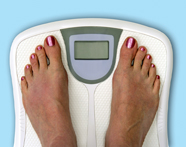Healthy Weight Gain

Healthy Weight Gain
No pregnant woman looks forward to gaining more weight than necessary during pregnancy, so let’s talk about the numbers right away. A woman who is at a healthy weight at the onset of pregnancy is advised to gain between 25 to 35 pounds during nine months.
Enough calories
Looking at it another way, growing a healthy baby takes more than 85,000 calories, in addition to the calories you need for your own energy requirements. If you gain about one pound per week during the second and third trimesters, it’s a good sign that you are getting enough calories.
Of course, if you were underweight at the start of your pregnancy, your health-care provider may recommend that you gain 28 to 40 pounds, and, likewise, if you were overweight before pregnancy, you may be advised to gain only 15 to 25 pounds. While you may think you know which category you fit into already, it’s best if you use the body mass index (BMI) scale to get an accurate picture.
Restriction and restraint
Whatever your BMI and weight gain numbers are, it’s important not to restrict your weight gain by dieting or skipping meals. This could have serious effects on the development of the baby. But don’t let yourself go either. It’s okay to give in to the occasional craving for potato chips or candy bars, as long as you’re making healthy choices about the nutrients you consume overall. But while you’re at it, why not forgo that candy bar and snack on something sweet and also rich in vitamin C, like an orange or some berries? Don’t worry – with a little extra effort, you’ll be able to fit into your regular clothes after your baby is born! Until then, pay careful attention not only to your caloric intake but also to the amounts of folic acid, zinc, protein, iron, and calcium you’re getting from all sources (food as well as supplements).
Weight gain imbalance
Weight gained during pregnancy is made up of the weight of the baby, breast tissue, amniotic fluid, placenta, uterus, blood, maternal fat tissue, and other fluids. Not gaining enough weight can increase the risk of a baby being born prematurely or with low birth weight, which can lead to health issues. Gaining too much weight can lead to a high birth weight baby, making the delivery more difficult and also putting the baby’s health at risk. It can also increase your risk of developing gestational diabetes.
Did You Know?
High BMI Research suggests that women with a BMI greater than 35 who remain weight neutral throughout pregnancy are at no greater risk of premature birth or delivery of a low birth weight baby than those with a healthy weight and the recommended weight gain, and may in fact reduce their risk of gestational diabetes.
How To…
Calculate and Interpret BMI In order to determine how much weight you should gain, you first need to know your prepregnancy body mass index (BMI). The BMI is a number based on your weight and height.
BMI calculation in imperial measure
(Weight in pounds x 700) ÷ (Height in inches x Height in inches) = BMI
For example: (145 pounds x 700) ÷ (65 inches x 65 inches) = 24
BMI calculation in metric measure
Weight in kilograms ÷ (Height in meters x Height in meters) = BMI
For example: 65.9 kilograms ÷ (1.65 meters x 1.65 meters) = 24
You may want to use your pregnancy diary to record these calculations. You can also use the BMI electronic calculator or the charts online at the National Center for Health Statistics (www.cdc.gov/nchs) or ask your health-care provider for help.
Interpreting BMI Categories
- Healthy weight: If your BMI prior to pregnancy was between 18.5 and 24.9,you are within the healthy weight range before pregnancy.
- Underweight: If your BMI was below 18.5, you are underweight.
- Overweight: If it was above 24.9, you are overweight.
- Obesity: If your BMI was above 30, you are considered to be obese.
Pregnancy weight gain recommendations
- Healthy weight: If your BMI is in the healthy range, gaining 25 to 35 lbs (11.5 to 16 kg) is recommended.
- Underweight: If your BMI is in the underweight category, gaining 28 to 40 lbs (12.5 to 18 kg) is suggested.
- Overweight: If your BMI is in the overweight category, gaining 15 to 25 lbs (7 to 11.5 kg) is recommended.
- Obese: If your BMI is in the obese category, gaining 11 to 20 lbs (5 to 9 kg) is recommended.
- In all BMI categories, gaining 2 to 8 lbs (1 to 3.5 kg) in the first trimester is suggested
- For healthy-weight pregnancies, gaining lb (0.4 kg) each week in the second and third trimester is recommended.




